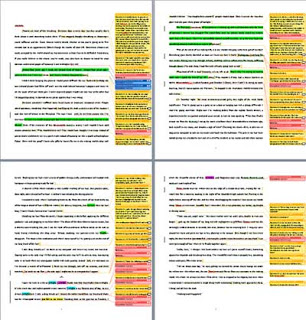I had a phone call with my wonderful editresses last night and we went over some things that essentially mean I will be rewriting 3/4 of Sing, Sweet Nightingale. We were on Skype, so I could tell they were kind of waiting for me to start going crazy. The fact that I neither started crying nor tried to jump through the computer screen to maul them seemed surprising, so that got me thinking about the way authors handle revision suggestions. The psychology major in me was intrigued and thus we end up with this post.
Kind of like for parents, it is necessary for a writer to love her book. NECESSARY. I will accept no arguments on this point, kay? Good. Now that we have that established, let’s talk about what happens when someone tears into your work for the first time and points out all the holes, inconsistencies, pacing problems, character issues, and generally sucky spots.
That’s right. You end up looking like this child. Either that or you turn into rabid lioness and try to shred anyone stupid enough to get to close. The problem is, neither of these reactions are productive! They can be, however, the first phase of the revision process.
1- Hurt
“WHY DOES EVERYONE HATE ME?! HOW COULD THEY SAY SUCH MEAN THINGS?! THIS IS MY BABY! THEY JUST DON’T UNDERSTAND!!”
This reaction, while overblown, is completely natural. Someone is telling you the idea you nurtured from infancy and shaped into this beautiful thing called a book isn’t working. It’s flawed. Maybe heavily. Feel it, live through it, and then let it go so you can move on to:
2- Denial
“They signed me and read it in one sitting and they’re supposed to be my best friend, but they don’t actually know anything about book. They have to be wrong. They THINK they’re being helpful, but if they hadn’t absolutely loved the book they wouldn’t have even read it. SO THERE.”
Nothing is perfect. Ever. There’s no such thing. We just have to try to get ourselves and our work as good as we can get it and chances are you’re not going to do that on the first try. And maybe not even on the tenth. The sooner you accept that, the happier you’ll be. And this applies to both writing and life in general.
3- Bargaining
“Well, what if I sent so-and-so to Sibera?! That would fix the plot problem, right? And then I would get to keep this little shiny section I love so much that doesn’t really fit here, right? RIGHT?!”
You might come up with some crazy ideas and try to pass them off as good. Maybe you’re stuck and maybe you’re trying to save a particular part of the story you adore, either way if you’re getting weird looks when you explain your ideas you might want to reconsider actually putting them in writing.
4- Slow Acceptance
“I finally reread the book and I guess, MAYBE, I can see what they mean about this one part told in second person totally distracting from the rest of the first person narrative. But it seemed so quirky and original at the time!”
This step is arguably the most important. This is when you once again become capable of rational thought and are able to look at your book through the editor’s eyes and see what they’re seeing. Then you can look at it again through your knowledge of the world and hopefully end up hit with:
5- Inspiration
“OMG! I just had this brilliant idea! What if A and B went to X and did Y?! It would fix everything and it’s SO MUCH BETTER than what I had before! How could I have been such an idiot? Why didn’t I think of this the first time around?!”
All the pieces have finally come together! You see the editor’s changes and raise them a rewrite of four other chapters that suddenly you’re absolutely certain you can make shinier. YOU ARE AUTHOR! Nothing can stand in your way. Now go lock yourself in a room and start typing. 😉
If you ever get stuck on any of the phases before Inspiration, just try imagining how shiny and wonderful and compelling and three-dimensional and addictive and beautiful your book will be once your editors are done with you. Then, suddenly, you feel like this:
And that, friends, is a very great place to be. 😀
Like this:
Like Loading...










